- Home
- Jr. Horatio Alger
Ben, the Luggage Boy; Or, Among the Wharves Page 2
Ben, the Luggage Boy; Or, Among the Wharves Read online
Page 2
CHAPTER II.
HOW BEN COMMENCED HIS STREET LIFE.
One pleasant morning, six years before the date at which this storycommences, a small coasting-vessel drew up at a North River pier in thelower part of the city. It was loaded with freight, but there was atleast one passenger on board. A boy of ten, dressed in a neat jacket andpants of gray-mixed cloth, stood on deck, watching with interest thebusy city which they had just reached.
"Well, bub, here we are," said the captain as he passed. "I suppose youknow your way home."
"Yes, sir."
"Are you going on shore now?"
"Yes, sir."
"Well, good luck to you, my lad. If you are ever down this way, when I'min port, I shall be glad to see you."
"Thank you, sir; good-by."
"Good-by."
Ben clambered over the side, and stepped upon the wharf. In the greatcity he knew no one, and he was an utter stranger to the streets, neverbefore having visited it. He was about to begin life for himself at theage of ten. He had voluntarily undertaken to support himself, leavingbehind him a comfortable home, where he had been well cared for. I mustexplain how this came about.
Ben had a pleasant face, and would be considered good-looking. But therewas a flash in his eye, when aroused, which showed that he had a quicktemper, and there was an expression of firmness, unusual to one soyoung, which might have been read by an experienced physiognomist. Hewas quick-tempered, proud, and probably obstinate. Yet with thesequalities he was pleasant in his manners, and had a sense of humor,which made him a favorite among his companions.
His father was a coal-dealer in a town a few miles distant fromPhiladelphia, of a hasty temper like Ben himself. A week before he hadpunished Ben severely for a fault which he had not committed. The boy'spride revolted at the injustice, and, young as he was, he resolved torun away. I suppose there are few boys who do not form this resolutionat some time or other in their lives; but as a general thing it amountsto nothing. With Ben it was different. His was a strong nature, whetherfor good or for evil, and when he decided to do anything he was noteasily moved from his resolve. He forgot, in the present case, that,though he had been unjustly punished, the injustice was not intentionalon the part of his father, who had been under a wrong impressionrespecting him. But right or wrong, Ben made up his mind to run away;and he did so. It was two or three days before a good opportunitypresented itself. Then, with a couple of shirts and collars rolled up ina small bundle, he made his escape to Philadelphia, and after roamingabout the streets for several hours he made his way to the wharves,where he found a vessel bound for New York. Representing to the captainthat he lived in New York, and had no money to pay his passage home,that officer, who was a good-natured man, agreed to carry him fornothing.
The voyage was now over, and Ben landed, as we have said, an utterstranger, with very indefinite ideas as to how he was to make hisliving. He had told the captain that he knew his way home, for havingfalsely represented that he lived in New York, he was in a mannercompelled to this additional falsehood. Still, in spite of hisfriendless condition, his spirits were very good. The sun shonebrightly; all looked animated and cheerful. Ben saw numbers of men atwork about him, and he thought, "It will be a pity if I cannot make aliving."
He did not care to linger about the wharf, for the captain might be ledto doubt his story. Accordingly he crossed the street, and at a ventureturned up a street facing the wharf.
Ben did not know much about New York, even by report. But he had heardof Broadway,--as who has not?--and this was about all he did know. When,therefore, he had gone a short distance, he ventured to ask aboot-black, whom he encountered at the corner of the next block, "Canyou tell me the shortest way to Broadway?"
"Follow your nose, Johnny," was the reply.
"My name isn't Johnny," replied Ben, rather indignant at thefamiliarity. He had not learned that, in New York, Johnny is the genericname for boy, where the specific name is unknown.
"Aint it though?" returned the boot-black "What's the price of turnipsout where you live?"
"I'll make your nose turn up if you aint careful," retorted Ben,wrathfully.
"You'll do," said the boot-black, favorably impressed by Ben's pluck."Just go straight ahead, and you'll come to Broadway. I'm going thatway, and you can come along with me if you want to."
"Thank you," said Ben, appeased by the boy's changed manner.
"Are you going to stay here?" inquired his new acquaintance.
"Yes," said Ben; "I'm going to live here."
"Where do your friends live?"
"I haven't got any friends in New York," said Ben, with a littlehesitation.
"Over in Brooklyn, or Jersey, maybe?"
"No, I don't know anybody this way."
"Whew!" whistled the other. "How you goin' to live?"
"I expect to earn my living," said Ben, in a tone of importance.
"Father and mother dead?"
"No, they're alive."
"I s'pose they're poor?"
"No, they're not; they're well off."
The boot-black looked puzzled.
"Why didn't you stay at home then? Wouldn't they let you?"
"Of course they would. The fact is, I've run away."
"Maybe they'd adopt me instead of you."
"I don't think they would," said Ben, laughing.
"I wish somebody with lots of cash would adopt me, and make a gentlemanof me. It would be a good sight better'n blackin' boots."
"Do you make much money that way?" inquired Ben.
"Pleasant days like this, sometimes I make a dollar, but when it rainsthere aint much doin'."
"How much have you made this morning?" asked Ben, with interest.
"Sixty cents."
"Sixty cents, and it isn't more than ten o'clock. That's doing prettywell."
"'Taint so good in the afternoon. Most every body gets their bootsblacked in the mornin'. What are you goin' to do?"
"I don't know," said Ben.
"Goin' to black boots? I'll show you how," said the other, generouslyoverlooking all considerations of possible rivalry.
"I don't think I should like that very well," said Ben, slowly.
Having been brought up in a comfortable home, he had a prejudice infavor of clean hands and unsoiled clothes,--a prejudice of which hisstreet life speedily cured him.
"I think I should rather sell papers, or go into a store," said Ben.
"You can't make so much money sellin' papers," said his newacquaintance. "Then you might get 'stuck'".
"What's that?" inquired Ben, innocently.
"Don't you know?" asked the boot-black, wonderingly. "Why, it's whenyou've got more papers than you can sell. That's what takes off theprofits. I was a newsboy once; but it's too hard work for the money.There aint no chance of gettin' stuck on my business."
"It's rather a dirty business," said Ben, venturing to state his mainobjection, at the risk of offending. But Jerry Collins, for that was hisname, was not very sensitive on this score.
"What's the odds?" he said, indifferently. "A feller gets used to it."
Ben looked at Jerry's begrimed hands, and clothes liberally marked withspots of blacking, and he felt that he was not quite ready to get usedto appearing in public in this way. He was yet young in his street life.The time came when he ceased to be so particular.
"Where do you board?" asked Ben, after a little pause.
Jerry Collins stared at the questioner as if he suspected that a jokewas intended. But Ben's serious face assured him that he was in earnest.
"You're jolly green," he remarked, sententiously.
"Look here," said Ben, with spirit, "I'll give you a licking if you saythat again."
It may be considered rather singular that Jerry, Instead of resentingthis threat, was led by it to regard Ben with favor.
"I didn't mean anything," he said, by way of apology. "You're a trump,and you'll get over it when you've been in the city a week."
&nbs
p; "What made you call me green?" asked Ben.
"Did you think I boarded up to the Fifth Avenue?" asked Jerry.
"What's that,--a hotel?"
"Yes, it's one of the big hotels, where they eat off gold plates."
"No, I don't suppose you board there," said Ben, laughing; "but Isuppose there are cheaper boarding-places. Where do you sleep?"
"Sometimes in wagons, or in door-ways, on the docks, or anywhere where Iget a chance."
"Don't you get cold sleeping out-doors?" asked Ben.
"Oh, I'm used to it," said Jerry. "When it's cold I go to the LodgingHouse."
"What's that?"
Jerry explained that there was a Newsboys' Lodging House, where a bedcould be obtained for six cents a night.
"That's cheap," said Ben.
"'Taint so cheap as sleepin' out-doors," returned the boot-black.
This was true; but Ben thought he would rather pay the six cents thansleep out, if it were only for the damage likely to come to his clothes,which were yet clean and neat. Looking at Jerry's suit, however, he sawthat this consideration would be likely to have less weight with him. Hebegan to understand that he had entered upon a very different life fromthe one he had hitherto led. He was not easily daunted, however.
"If he can stand it, I can," he said to himself.

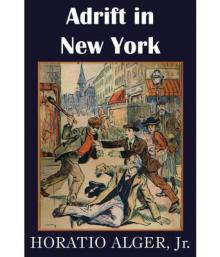 Adrift in New York: Tom and Florence Braving the World
Adrift in New York: Tom and Florence Braving the World Do and Dare — a Brave Boy's Fight for Fortune
Do and Dare — a Brave Boy's Fight for Fortune The Cash Boy
The Cash Boy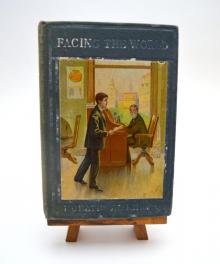 Facing the World
Facing the World The Young Explorer; Or, Claiming His Fortune
The Young Explorer; Or, Claiming His Fortune The Store Boy
The Store Boy Frank's Campaign; Or, The Farm and the Camp
Frank's Campaign; Or, The Farm and the Camp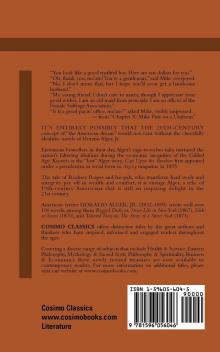 Cast Upon the Breakers
Cast Upon the Breakers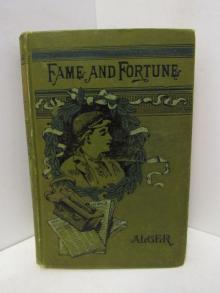 Fame and Fortune; or, The Progress of Richard Hunter
Fame and Fortune; or, The Progress of Richard Hunter The Errand Boy; Or, How Phil Brent Won Success
The Errand Boy; Or, How Phil Brent Won Success Bernard Brooks' Adventures: The Experience of a Plucky Boy
Bernard Brooks' Adventures: The Experience of a Plucky Boy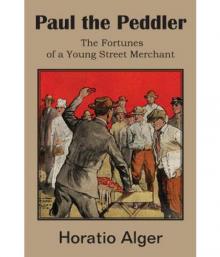 Paul the Peddler; Or, The Fortunes of a Young Street Merchant
Paul the Peddler; Or, The Fortunes of a Young Street Merchant Brave and Bold; Or, The Fortunes of Robert Rushton
Brave and Bold; Or, The Fortunes of Robert Rushton Try and Trust; Or, Abner Holden's Bound Boy
Try and Trust; Or, Abner Holden's Bound Boy Phil, the Fiddler
Phil, the Fiddler In A New World; or, Among The Gold Fields Of Australia
In A New World; or, Among The Gold Fields Of Australia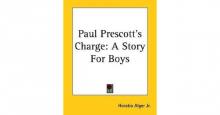 Paul Prescott's Charge
Paul Prescott's Charge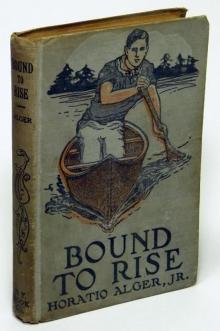 Joe's Luck; Or, Always Wide Awake
Joe's Luck; Or, Always Wide Awake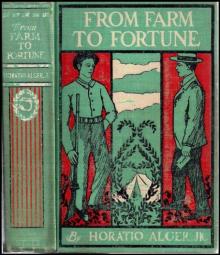 From Farm to Fortune; or, Nat Nason's Strange Experience
From Farm to Fortune; or, Nat Nason's Strange Experience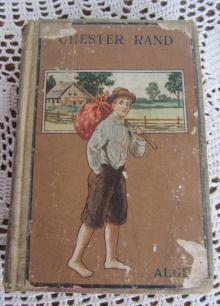 Chester Rand; or, The New Path to Fortune
Chester Rand; or, The New Path to Fortune Driven from Home; Or, Carl Crawford's Experience
Driven from Home; Or, Carl Crawford's Experience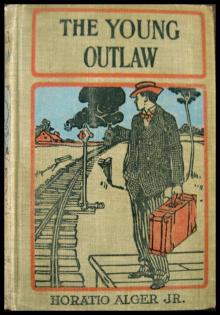 The Young Outlaw; or, Adrift in the Streets
The Young Outlaw; or, Adrift in the Streets Risen from the Ranks; Or, Harry Walton's Success
Risen from the Ranks; Or, Harry Walton's Success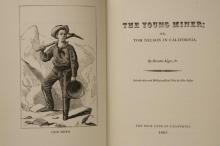 The Young Miner; Or, Tom Nelson in California
The Young Miner; Or, Tom Nelson in California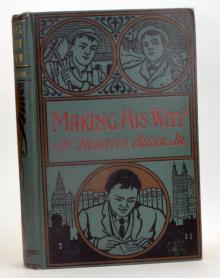 Making His Way; Or, Frank Courtney's Struggle Upward
Making His Way; Or, Frank Courtney's Struggle Upward Ben, the Luggage Boy; Or, Among the Wharves
Ben, the Luggage Boy; Or, Among the Wharves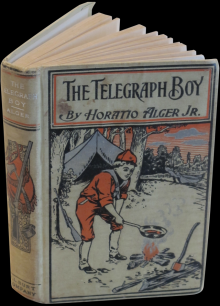 The Telegraph Boy
The Telegraph Boy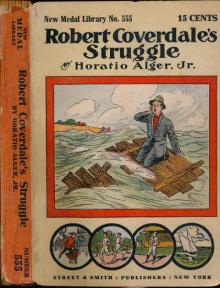 Robert Coverdale's Struggle; Or, on the Wave of Success
Robert Coverdale's Struggle; Or, on the Wave of Success Rufus and Rose; Or, The Fortunes of Rough and Ready
Rufus and Rose; Or, The Fortunes of Rough and Ready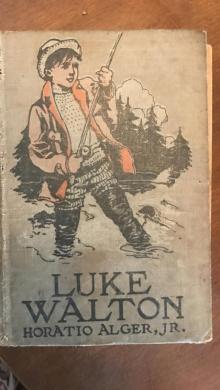 Luke Walton
Luke Walton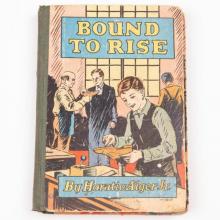 Mark Mason's Victory: The Trials and Triumphs of a Telegraph Boy
Mark Mason's Victory: The Trials and Triumphs of a Telegraph Boy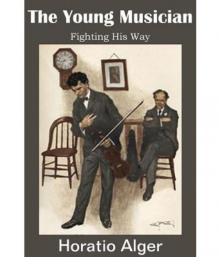 The Young Musician; Or, Fighting His Way
The Young Musician; Or, Fighting His Way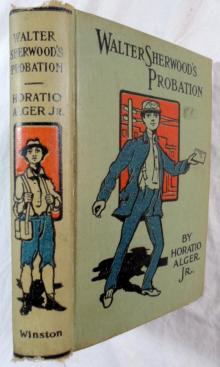 Walter Sherwood's Probation
Walter Sherwood's Probation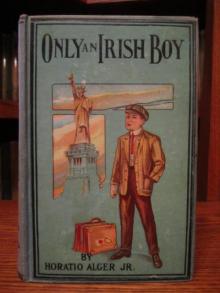 Only an Irish Boy; Or, Andy Burke's Fortunes
Only an Irish Boy; Or, Andy Burke's Fortunes Slow and Sure: The Story of Paul Hoffman the Young Street-Merchant
Slow and Sure: The Story of Paul Hoffman the Young Street-Merchant Herbert Carter's Legacy; Or, the Inventor's Son
Herbert Carter's Legacy; Or, the Inventor's Son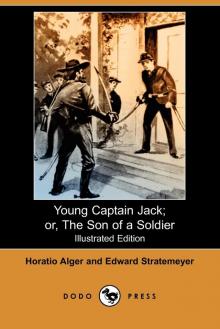 Young Captain Jack; Or, The Son of a Soldier
Young Captain Jack; Or, The Son of a Soldier Timothy Crump's Ward: A Story of American Life
Timothy Crump's Ward: A Story of American Life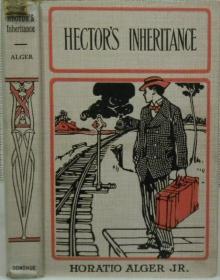 Hector's Inheritance, Or, the Boys of Smith Institute
Hector's Inheritance, Or, the Boys of Smith Institute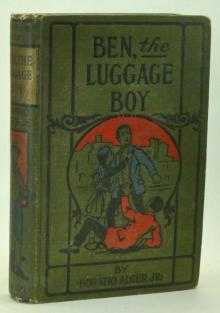 Ben's Nugget; Or, A Boy's Search For Fortune
Ben's Nugget; Or, A Boy's Search For Fortune